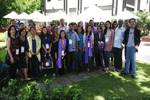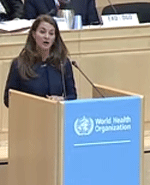Social Watch News
Published on Fri, 2014-05-30 09:33
Civil society groups from Asia and the Pacific met in Bangkok from May 15-17, 2014 to develop regional recommendations on just and sustainable development for action at the Asia Pacific Forum on Sustainable Development. The Asia Pacific region has seen rapid growth, and significant improvements in the lives of millions of people over the last decades but grave challenges remain. The region still has the largest concentration of people without adequate food, income and employment. Inequalities in the distribution of wealth, power and resources between and within countries, and among rich and poor, men and women, social groups, and current and future generations, are growing and undermining wellbeing for the majority of the population. |
| Source: . Published on Fri, 2014-05-30 00:00 |
Published on Thu, 2014-05-29 16:15
Before the world economy has been able to fully recover from the crisis that began more than five years ago, there is a widespread fear that we may be poised for yet another crisis, this time in emerging economies (EEs). Once again, most specialists on international economic matters have been caught unawares. In fact, the signs of external financial fragility in several emerging economies have been visible since the beginning of the financial crisis in the US and Europe. The South Centre has constantly warned that the boom in capital flows that had started in the first half of the 2000s and continued even after the Lehman collapse is generating serious imbalances in the developing world along with the danger of a sudden stop and reversal. |
Published on Thu, 2014-05-29 15:00
On Tuesday the 27th of May 2014, Mirjam van Reisen was interviewed by the Dutch newspaper the ‘Volkskrant’ concerning the human trafficking of Eritrean refugees. She explains that those in power in Eritrea richly profit from the human trafficking and even find ways to extort money from Eritrean refugees in Europe via taxation. In addition, it is likely that Eritrea also profits from the extortion of Eritrean families in Europe who pay human traffickers money in order to save their kidnapped relative. An incredible amount of money circulates within these human trafficking practices and estimations surpass 600 million Euro’s in the last 5 years alone. In order to protect Eritrean refugees and in the attempt to stop these criminal practices, Mirjam van Reisen advises to close all Eritrean embassies in Europe, to better secure refugee camps where refugees are kidnapped from, and to cooperate with refugees to reveal and capture those responsible for these criminal practices. |
Published on Thu, 2014-05-29 13:46
Every year the World Bank issues its Doing Business Report, which contains a ranking of each country’s business environment. In 2012, the President of the World Bank, Dr. Jim Yong Kim, appointed an Independent Panel of experts to review the report. The panel, chaired by South Africa’s Minister of Planning Mr. Trevor Manuel, appeared to be an opportunity to change the report for the better. The Panel, indeed, came up with substantive recommendations for an overhaul of the Doing Business. But most of them have been ignored. Those who understand the power of this report and its associated rankings to drive governments and give them the cover to put the interest of private companies ahead of the rights of working people and their families may win again if we don’t speak up. |
|
Published on Fri, 2014-05-23 09:13
» |
|
Published on Thu, 2014-05-22 22:54
The undersigned organizations condemn the security forces storming of the Egyptian Center for Economic and Social Rights, Alexandria Branch, and note that such attack is an expected escalation, amidst the growing incitement in the media, and defamation campaigns, which have been targeting human rights organizations and human rights defenders in Egypt. Egyptian security forces, alongside security personnel dressed in civilian attire, raided the Alexandria Branch of The Egyptian Center for Economic and Social Rights, arresting 15, including two minors, and two ECESR staff, and confiscating several computers and documents. The arrested were taken to the Alexandria Security Department where they were held, until released hours later. |
Published on Thu, 2014-05-22 11:00
With two more sessions left to go, work at the United Nations on the Sustainable Development Goals (SDGs) faces continuing challenges. On Friday 9 May, the Co-Chairs of the Open Working Group (OWG) on Sustainable Development Goals (SDGs) produced a narrative ‘chapeau' of two pages that will accompany the framework of the goals, sent to all Member States. The 11th session of the OWG took place on 5-9 May at the UN headquarters in New York. The Co-Chairs are Ambassadors Macharia Kamau of Kenya and Csaba Korosi of Hungary. Since the OWG started holding intergovernmental discussions in March 2013, developing countries in the Group of 77 and China (G77) have consistently called for a narrative to accompany the SDG framework. |
Published on Mon, 2014-05-19 00:14
We the undersigned organizations express our strong protest against the decision of the World Health Organization (WHO) to invite Melinda Gates (of the Bill and Melinda Gates Foundation – BMGF) as the keynote speaker at the 67th World Health Assembly, that begun in Geneva on 19th May. This is the third time in the last 10 years that someone from the BMGF and of the family has been an invited speaker at the WHA (Melinda Gates was preceded by her husband Bill Gates, in 2005 and 2011). Ms. Melinda Gates’ credentials as a leader in public health are unclear. It is unacceptable that the WHO, supposedly governed by sovereign nation states, should countenance that at its annual global conference, the keynote address would be delivered thrice in ten years by individuals from the same private organization, and from the same family. |
|
Published on Fri, 2014-05-16 08:58
» |
SUSCRIBE TO OUR NEWSLETTER









